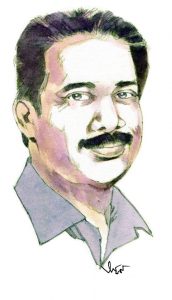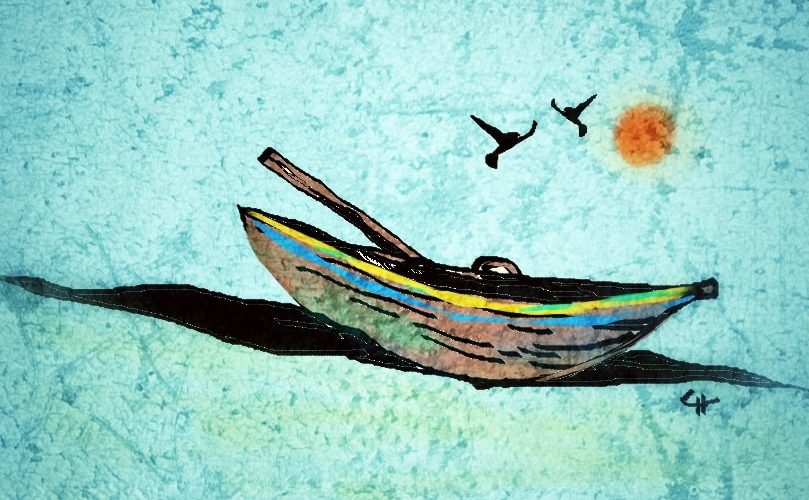Telugu: Gorusu Jagadeeshwara Reddy

With the words that came out of Vimala teacher’s mouth, the jangri I was eating felt suddenly bitter. As I felt a shock, I stopped chewing and looked in her direction.
“I too didn’t believe at first. I went during the recent Dasara to Wanaparthy. You know Golla Neelamma who lives near our house, don’t you? She used to give us milk. She said so. Poornamma lived with her son for a while, I believe. After that, unable to live in the city, she came back home and jumped into the karanam’s well, the very second day of her return.” Vimala teacher continued to say.
“Poornamma is dead.” That seemed to be the only thing reverberating in my ears. I met the teacher unexpectedly at the wedding dinner of someone I knew. In my childhood, she used to live in the street next to ours. My entire childhood was spent in Wanaparthy. Though my relationship with that place had been severed twenty five years ago, the wetness of the memories of those days had not dried up.
Teacher said, “I’ll see you later,” and went away. I was unable to digest “Poornamma’s suicide” that she uttered in my ears.
That Poornamma jumped into the well…Those who knew here well would be surprised and look strangely at those who said it. That was because she was an ace swimmer. In her youth she taught hundreds like me how to swim. When she saw children who could not swim properly about to drown, she would jump like a lightning and bring them to the shore. She had the talent to swim against the current. She could face life with stubborn courage.
Such a woman, committing suicide in her old age? Even if it was true—how could I believe it?
What catastrophe befell her that she had to commit suicide? I knew that the son was working in some government firm in the city. Even if he lived his life, she had the capacity to sell some vegetable or fruit and lead her life.
The more I thought, the heavier my heart grew. Some pain was gnawing at my heart. As I felt the lights glisten in the tears that poured out effortlessly from my eyes, I wiped my eyes. I did not feel like eating. I threw the plate in the basin and washed my hands.
I could not tolerate the marriage atmosphere. Though my friends talked to me, I could not interact with them normally.
Even when I returned home, Poornamma still floated in front of my eyes.
I was constantly reminded of my childhood spent around her. I felt the urge to go to Wanaparthy. Poornamma was not there. But I felt strongly about going there. I decided to go there.
The events of twenty eight years ago—
The Poornamma I first saw used to live with her ten year old son in the house opposite ours. Father had been transferred from Mahbubnagar to Wanaparthy. He used to work as a constable. Because of our economic condition, the house we rented was a in a corner of the town, on the way to the fields, on a street called Rayigadda. The house rents were low there. At that time I was studying in the seventh class in the local Zilla Parishad High School. Everyone in that street would make a living as a coolie or something like that, would bring home that day’s earnings and get by that day. Everyone had a tiny storeyed house. It would be plastered with white sand.
It took me a while to be acquainted with all of them. When I knew them, it did not take me too long to become one with them.
Poornamma who lived in front of our house was wheat complexioned, thin and tall. She used to come now and then to our house with her son Raju, sit at the threshold and chat with my mother.
In the context of talking openly about her past…she would say that she had no property other than her son. Six months after the son’s birth, her husband went in a group of Palamuru labourers towards Bellary, and never returned. She seemed to have waited some time for him. After getting the news that he was living with someone there, she was convinced he would not come back, stopped thinking of him and would say she was living only for her son.
There was no work Poornamma did not do. She would go for harvesting, for planting, for weeding, for carrying cement to the masons. According to the season she would sell custard apples, mangoes, berries, guavas, sapotas, melons, water melons, different kinds of fruits, boiled tubers, groundnuts, anumulu, alsandalu and horse gram. Along with this she would go to the forest daily, gather sticks and sell them to the entire village.
Children of my age would go to school with me and do coolie work with their parents during vacations.
Poornamma’s son would go to the forest with his mother. I told my mother that I would go along with them to the forest on Sundays and during vacations and bring sticks.
At first she threatened me saying, “Your father will skin you alive if he comes to know of it.”
Then she coaxed me and advised me that as I was born into the “Reddy” caste, I should not do such things. But I did not stop urging.
She would say I was getting spoilt roaming with all these people and give me a couple of whacks on my buttocks. People at home could not tolerate my tantrums.
Later, unable to stand my mischief and with Poornamma’s intervention, they yielded a bit. Raju seemed to have told his mother that I wanted to go to the forest. I heard Poornamma who had come for some curry or some pickle tell mother:
“Reddamma, send your son with us. Even if he gets a few sticks, it will take two days. We should teach children too about difficulties. You don’t know how hard my anna works. The policeman’s job means…near corpses, he has to stand without food or water till the postmortem is over. If a boy toils, is it wrong…Doesn’t my Raju fellow go to the school, isn’t he coming along with me to the forest? He’ll be one with my son, okay? I’ll take him this Sunday.” As Poornamma assured them, they agreed hesitantly.
Thus began my interaction with them.
When summer came, it was festive season for all of us.
No bother about school. Getting up before sunrise around four, going to the forest. Coming back with bundles of sticks in the afternoon, eating food and running to the karanam’s well.
Initially, not knowing to swim, I would dawdle at the edges of the well. Poornamma who had come along with us to wash the soiled clothes would notice me, would stretch out both her hands in the water, ask me to lie upside down and ask me to swim. When in fear and trepidation I moved my legs, forgetting my hands and moved my hands, forgetting my legs, …if I did both, swallowing water in fear. Thinking this wouldn’t do, she brought an empty kerosene tin, tied it to my waist and asked me to swim. Sometimes she would tie a drumstick stem. .
When within a week I could go to the middle of the well and swim, I felt proud as if I had conquered the world.
Poornamma was the guru who taught me swimming.
As we children would scream loudly and swim nude like little fish in the well, she would sit on a boulder near the edge of the well, wash her clothes with white sand and watch us at play.
“Be in the middle of the well. Don’t go towards the edge of the walls. In the walls of the well, there’ll be water snakes with elongated mouths. The crabs will slide into your underwear and bite off the penis,” she would say laughing.
Raju would spend some time putting out the clothes his mother washed at the well on the thangedu shrubs and would swim with us for some more time.
After washing the clothes, Poornamma would tuck her saree behind and would dive into the well from the stone pillar of the well with a thud and go deep into it. When his mother swam, Raju would whistle jumping with joy. We would be in all kinds of postures, straight like a crowbar, folding our knees, tying our hands tight around them, get wound like a ball, spinning round and round like a top…we would jump into the water.
But I would jump holding my nose. But none of us had the courage to go like Poornamma to the bottom of the well and bring out mud. If we stayed in water for a long time we could not hold our breath. Like a lotus leaf, Poornamma would float on water for a long time and keep gazing at the sun.
No matter the difficulties, Poornamma would show a lot of interest in Raju’s education. Now and again, she would go to the school and enquire with teachers about her son’s studies. She would send him to Vimala teacher for private tuition. The teacher would not take money from her.
“Reddamma, he’s a fatherless son. No matter my difficulties, no matter if I die, I won’t stop his studies. If he studies he’ll escape this kind of hard life. He’ll at least get a government job. Never mind if he doesn’t take care of me. At least he’ll be able to look after his wife and children.” Like this, she would open her heart out to mother.
I never saw Poornamma worried. Laughing, making us laugh, she would gather all the children and draw them towards her. On moonlit nights—with cloth tied around her eyes, hide and seek, butter heaps, pinching nose, dice, card and such local games. Not just such games, she would give us puzzles and ask us to solve them. She would tell us stories of big kings like Kambhojaraju and Balanagamma and scary ghost stories.
If she kept us company, we would forget hunger. Gathering all the children together, clapping with all the women in the street, going around us¾ .
“Going around a dancing girl’s navel, in the moonlight with Somireddy’s sinful eyes, in the moonlight.” She knew many such melodious Boddemma songs.
Sometimes, we would go with Poornamma to the fields and gather dung and dry dung cakes, fill them up in baskets and bring them. We would bring husk from rice mills and groundnut-husk from groundnut mills and pat them on the dung.
In those days, every house would use wood, dung cakes and coal as cooking fuel. Kerosene shops would be rare to find.
The house that initially asked me not to go to forests and for dung cakes, slowly started using the wood and the dung cakes for cooking. They completely stopped buying wood from outside.
Isn’t it the truth that when the “economic condition” deteriorates, the towels on the shoulder, symbols of pride, turn to loin cloths!
After I wrote my ninth class exams, during one summer, an incident took place that is related to Poornamma’s courage.
Even now, it kept floating in front of my eyes.
As usual, getting up at four, there was commotion that day about getting ready to leave for the forest.
Whoever got up with the first cry of the cock, would go to the houses of those who had agreed to go to the forest the previous day and knock at their doors.
We would all find some coal piece, chew it well, clean our teeth briskly, wash our faces, tie up the rice, the roti made of jowar, ragi or sajja from the previous night, and leave carrying ropes, baskets and axes. They used to consider the axe the most expensive.
When the whole town was lolling in sleep, we would walk briskly on the roads, come on to the tar road past the bus stand, go towards Kurnool and turn towards the path leading to the forests three or four kilometres away.
If we were two or three children, there would be about ten other men and women.
It must have been the day before the new moon. On the east, a little above, a quarter of a moon was red and dim. The morning star had not emerged.
The conversation all through the journey would be about the film seen the previous night or about the quarrels between mothers-in-law and daughters-in-law or about the husband’s behaviour.
If they could not exchange news, they would sing and dance. The song from Poornamma’s throat would sound very sweet.
Raju and I were walking talking, about happenings at school. Sayamma, Balamani, Bandemma, Rangamma, Ramulanna, Kurmanna and a few others were in pairs.
All of us crossed the new well and were walking toward the banyan lake. Sayamma was relating the woes of her house.
“Poornaththa, let mud fall into his mouth, he caressed my cheek. That’s why though my mother said not to give the girl in marriage to some one on the other side of the stream, saying they are distant relatives, my paternal aunt, behaving like a co-wife, did not stop tormenting my father till he gave me away to this place. I cooked food at night. I put it on a big plate, I gave morsels equally, aththa, to my whore of a mother-in-law, to my bitch of a sister-in-law, to my husband and to me. I believe I gave her the smaller half and ate the bigger half. As soon as my mother-in-law came, she incited him. Both the mother and daughter told him things that were not quite true. I was expecting, was I not? Couldn’t my husband have said, she had an extra mouthful, so what…?
“Who doesn’t know about your mother-in-law, Sayamma. Didn’t we see every day when your father-in-law was alive, how he died of fear of her screamings.” Bandemma, who was walking next to her, added.
On the other side of the stream, meant the village near Gadwal across Krishna river—that was Sayamma’s village. As we were talking, we passed the banyan lake and were at the turning of nilagiri trees, when bullock carts came towards us.
The bullocks were coming in that dim light, shaking the bells around their necks, carrying the melons and water melons grown on the sandy soil of Krishna near Pebberu, Rangapuram and Beechupalli. At the fair in Wanaparthy, they would come not only from there but also from Kurnool and the banks of Tungabhadra where they were grown.
There were fourteen carts in all. The last cart passed by us. Balamani had a thieving mentality. Though Poornamma tried to dissuade her, she went walking behind the last cart, bending very very low.
After some time, when we heard a loud yell, “I’m dying…Let go my hand,” Poornamma ran there. Raju and I followed her.
The fellow in the cart held on to Balamani’s shoulders and started abusing her.
“You whore, did you think these fruits were grown by your paramour. How did you have the mind to steal? Do you eat food or….” The matter was clear. He was going to call out to the cart drivers who had gone ahead. As Poornamma quickly held on to Balamani’s shoulders and flung her this way, he lost his grip and fell backwards.
All of us ran back, without turning behind. Poornamma once again started scolding Balamani as to why she did not listen to her and went there.
“That’s not it, Poornakka. I went stealthily and put my hand in the cart and pulled it thinking they were black berries. I did not think it was the pig tail of that wretched fellow…” As Balamani was telling us, we started laughing and heaved a sigh that she had escaped the big hurdle.
As the road became visible in the light of the morning star, frogs and snakes were found crushed under the tyres of lorries. We left the tar road and went towards the pathway which was towards the sun.
Really huge mounds, as if heaps have been poured out, seemed calm with thick shrubs. We sat near the stream where we sat daily to eat out saddi. After eating, each one of us would take out cupped-handfuls of sand, make water holes, wait till we got clear water, bend on our knees, place our lips on it and suck the water.
Then we would dip the fibrous barks and tavise sticks we brought with us for a while in water, put them on our shoulders and walk again.
I used to love the morning beauty of the forest. The cries of different varieties of birds. Beautiful insects whose names I did not know would twirl in the wind. Rabbits that ran across our legs. Buraka birds that broke the silence suddenly with a “Brrr…” from the bushes.
All of us would go in groups, and as soon as the thick forest began, we would decide on where the halting place would be and would split in pairs.
That day we thought the halting place would be at Kochagutta. We would gather the sticks, come near the halting place and tie up the bundles. We would assign some names to the halting places in the forest.
They would mention the names of the halting place where some time in the past, some forester had molested and killed a girl and where the girl was supposed to be roaming about as a ghost and asked us not to go in that direction.
Raju, Poornamma and I split as a group. Poornamma would chop the tree which had dried up very much with an axe. She would show us trees and tell us their names. Tavise, bitli, yapa, manga, tugli, ooduga, paluvari, gooda gummadi…there would be different kinds like these. Among them, tugli trees would catch fire even when they were not dry.
“When we were young, there were lots of bears. They would follow women when they spotted them. Did we come this far for wood… If you came up to the new well, a lot of wood. Not these desavaththala wood, we would find teak wood, ragi wood…” She would regale us with how she and her mother went to the forest for wood.
We would find thangedu trees with the bark removed. She would say that they made colours with the bark of thangedu trees.
When we sometimes saw foxes and hounds, they would run away on hearing us clap.
Before all of us went back to our halting places after collecting sticks, we would shout out clearly the names of others. The entire forest would reverberate with the echo of our sounds. As it was spring, Raju and I would follow the cooing of koel and saying “coo,” we would sing tunes.
By the time we reached the halting place, the others were returning one by one. Everyone spread the ropes and the sticks a yard from each other and were tying the bundles by placing the thicker ones below the thinner ones, piling them up.
“The wood piece came and hit my face, my lord
I felt an inexpressible sorrow, my lord.”
Balamani was singing off tune and tying the bundle. Again, all of us recalling the incident of pulling the pigtail of the water melon cart-man that morning were laughing.
Even in tying the bundle of sticks, Balamani would demonstrate her intelligence. She would use less wood and make it appear as a huge bundle of sticks. Sharing this or that with the others, placing the bundles on our heads, we began to get down the hillock.
Beneath our feet, tiny pebbles. Even if we were a little careless, we would slide and fall along with the bundle.
Poornamma in front, then me, Raju, Balamani—all of us were walking down in that order. As soon as we got off the hillock and came to the ground level, we would put down the bundles near the lake, wash our faces with water, take rest for a while and commence our journey. If we went by the lake, we would get on to the tar road again.
That day, Poornamma who had set the bundles down and got into lake, brought out white and blue lilies and red lotuses.
We broke the lily stalks in two and wore them around our necks as garlands.
“He’s come…the chowkidar…”
As we were about to lift the bundles again, Balamani was running all of a sudden with her bundle towards the hillock.
There was suddenly a commotion in our midst.
I could not understand then who the chowkidar was and why everyone was running away, afraid of him. Poornamma quickly placed the bundles on Raju’s head, my head and her head and ran along the lake bund.
A fear that something that should not happen would happen…with trembling feet we were putting quick steps.
The others were running helter shelter. Then I saw the chowkidar. He stopped his motorcycle a little away from us, and was coming towards us with a long stick. He wore khaki clothes. When he saw us running, he followed us shouting, “Scoundrels, bitches, stop. You’re ruining the entire forest. Did you think this forest was your mother’s lover?…stop…or else…” Waving the stick in his hand, he left the others alone and ran behind us.
“Walk fast, Raju. That bloody thief will take away my axe…” Poornamma was speeding away like lightning. Unable to keep pace with her, both of us started bawling.
The palleru thorns under the feet were piercing through. We still had to go a kilometre to reach the tar road. Poornamma noticed two jeeps and the forest officers in them from a distance. This fellow was running behind us. If we went forward they would not leave us alone.
Poornamma thought for a second, threw away the bundle and stood there. As soon as the two of us reached her, she threw away our bundles too.
“Raju, that bastard is coming behind us…If we go forward onto the road…Did you see the chowkidars in the jeep… Without fear, the two of you should get into the lake. If he takes away the axe, we can’t buy it again… If we swim for quarter of an hour we’ll reach the nilagiri trees. We’ll go there, go to the banyan lake and walk back…” Before the chowkidar reached us, we got into the lake. The two of us kids were swimming on either side of Poornamma.
If we felt breathless, she would stretch both her hands in front and would ask us to hold her shoulders with our hands. The chowkidar was standing on the shore, shouting obscene abuses at us and throwing the stones he could lay his hands on towards us. Escaping them, we reached the nilagiri tree shore in quarter of an hour.
We took rest under the shade of that tree, and after we regained our breath, we headed home. By then our clothes were dry.
If Poornamma had not the courage to jump like that into the lake that day… I felt we could not have escaped the kicks of the chowkidars.
I did not tell people at home about this.
After that, for a few days; we children did not go to the forests. They started going to the forests which were not under the supervision of the chowkidars.
After coming to the tenth class, I reduced my trips to the forests. Poornamma too stopped selling wood and was completely involved in the fruit business.
When I was writing my tenth class exams, father was transferred to Upperu near Gadwal. All of us vacated our house in Wanaparthy and came to Gadwal. When we came here, Raju was studying in the eighth class.
When we were leaving town, Poornamma, eyes filled with tears, hugged me, and said:
“My son, you were like a child to me and kept my son company. You went around the forest with me. You went around mounds and trees. You got into the well and swam along with us. I thought of you as my older son. Reddamma…wherever you go, don’t forget me, thallee…”
Mother’s eyes too were filled with tears at Poornamma’s affection.
After that, I did not go to Wanaparthy at all. Going far away for college education, coming back home now and then—these things happened. If I saw friends from Wanaparthy, I would ask and get news about Poornamma. That Raju did a course in ITI and was working in some government firm in the city…that Poornamma was unable to do business because of ill-health and was living with her son, that she got Raju married…I would hear such things.
Job, marriage, children—as I was leading my life, fixing these three in a frame, Vimala teacher again took me back to my childhood by relating the sad incident.
I went to Wanaparthy two days after Vimala teacher gave me the news. The difference between the town twenty five years ago and now was all too striking.
Though the streets were the same…the houses on either side of me seemed small. There was no way anyone would recognise me in Rayigadda street…but there would be some among them who I would be able to recognise.
I stepped into that street as darkness was enveloping. As I walked again on the streets I had walked in my childhood, I had goose pimples all over me.
Some I met on the way looked at me with curiosity as if they had not seen me before. Some anxiety, some fear troubled me as I neared Poornamma’s house. The same small storeyed house. Someone seemed to be in there.
I went and stood in front of the house. I examined closely the person who came out because of my presence.
“Who do you want?” I thought she was perhaps Raju’s wife.
“Is Raju there?”
“He isn’t there. Where did you come from? I’ve never seen you before.” I did not know how to reply to her words.
“Isn’t this Poornamma’s house? Twenty five years ago we used to live in that house opposite.” It was difficult to introduce myself.
“Aththa, is dead, didn’t you know anna?”
“I came to know of it and came here to speak to you all. Weren’t Sayamma, Bandemma, Balamani living here?”
“They’re there. Sit down, please. I’ll get Sayaththa.” She brought a chair from inside and put it in the front yard. I did not feel like sitting down. I kept standing and looked in the direction of the house we lived in. Someone seemed to have rented it.
Isn’t it on this very land I was standing on, on this very front yard that I played around with my tiny feet twenty five years ago, that Poornamma would make us sit there and sing Gobbemma songs going around us…
She brought Sayamma along with her.
“Who are you, my son?” She was trembling a bit in her old age. She came near me and examined me.
“It’s me, Sayamma. Didn’t we live in that house? I used to go with you to the forests, don’t you remember?” On hearing my words, she thought for a while.
“Yes! So long ago…You were small, this much. You’re the policeman’s son, right! Latchmi…Our Raju’s friend. When he was young, this boy went around with your aththa…how many years since, my son. Are you married? How many children? Are your parents fine…” Sayamma spoke with affection.
“Everyone’s fine…I came on hearing about Poornamma.”
“Is that so…oh my son! You came all that way to see us…Poornamma is dead, my son. She loved you so much, isn’t it so?”
“Why did this happen, Sayamma. During our childhood, Poornamma wanted very much to educate Raju.”
“She educated Raju well. He was able to get himself a government job. She got him married to Latchmi. What do you think is Latchmi’s home town? Gudlanarva near Devunipalem. Gave birth to two girls. They were living quite well in the city. Poornamma would visit her son and come back. She went through a lot to educate Raju, didn’t she? How happy she was that he had a government job! Don’t know what happened, my son, just like that her health became bad. We asked her to stop selling fruits and sent her to the city to her son…” As Sayamma was telling me all this, Latchmi came with tea and placed it in my hand.
“Aththa was with us, anna. We treated her in the hospital with my husband’s ESI card. Doctors said it was heart trouble. They used to write expensive medicines for it. They used to give us those medicines. With those, her health had improved a bit. Just our ill luck, I don’t know what came upon us…anna, bad times befell my husband’s company. Since a year, they’ve not been paying the salary properly. They hadn’t increased the salary in seven years. We lived like that. When we had ESI we showed her there. Without jobs, I believe, they don’t allow us into those hospitals. It’s six months since the company shut down. The money they gave us when it was shut down was just enough to repay the loans. They took our jobs off like this in the middle and shoved us on to the roads. We had admitted our children in a convent. As we couldn’t pay the monthly fees, they didn’t allow them to come to school. Aththa’s illness took a turn for the worse. We took her to the government hospital but there were no medicines there. When we took her to a private hospital, they asked for thousands. Even then, he took loans and took his mother there. There was not a paisa in the hands. The job he had was taken away. If we don’t pay rent, will the owner keep quiet? He shouted at us. We were unable to buy even a grain of food. We made our children go hungry. It was difficult even to get by a single day, anna. Like thieves looting and sharing the spoils, don’t know who got together and swindled the company…
‘Government servant, government servant—I was keen on it, curse on government servant! They took away the job in the middle, those sons of whores. If he had worked hard anywhere in the village, he would have had some food to eat. Why did your life become like this, my son,’ Saying this my aththa started weeping.
‘Don’t take a loan and buy medicines. I’ll die like this…Don’t be debt ridden because of me.’ This was aththa’s only worry. After he lost the job, he was not like himself anymore. He went to every company he could find. He couldn’t get employment anywhere.
Saying, I feel the urge to see the village, I’ll go there once and come back, no matter how much we—the husband and wife—tried to persuade her, she made her son put her on the bus and came here. “With my own hands I put her on the bus and killed her.” Saying this, she wept copiously.
“We stopped our children’s education. Then he sent us to this village. Like an insane person—roaming every lane, don’t know where he is, what he is eating…they threw mud on our lives, they made a mess of our lives, anna. They pulled away the morsel from near our mouth. Our curse be on them…when the stomach burns, we feel like abusing, anna.” Latchmi stopped talking all of a sudden. About to say something, she could not and she bawled.
“Why do you cry, you crazy girl? Will the fellow who gave us birth, kill us? Can’t we work hard and survive somehow? Why should you be scared when you have your legs and hands?” Sayamma turned towards me, even as she cajoled Latchmi.
“My son, when Poornamma came to the village, she didn’t speak to anyone, didn’t exchange pleasantries, didn’t eat a mouthful. She said she wouldn’t go back to the city, to her son. ‘They have removed his government job… They set fire to their lives.’…Saying this, she would keep crying. Don’t know what time she got up at night and went to the well, my son… When we couldn’t find Poornamma in the morning, we searched the entire village. The next day, at this time, she floated as a corpse in the karanam’s well.”
“She who taught swimming to everyone in the village, tied ropes to her feet so she couldn’t swim, my son… She died a cruel death, my son, why such a fate, my son …” In Sayamma mines of memory were receding.
When her sad tune surrounded me like vines, I came to know the reasons behind Poornamma’s death.
___________
Gorusu Jagadeeswara Reddy Telugu Katha 1999, “Gaja Eetharalu” pp. 66-78. Tr. by Alladi Uma and M. Sridhar.
*









గొరుసు గారి కథను ఇంగ్లీష్ లో చూడడం చాలా సంతోషంగా ఉంది. మా బెంగళూరు రామన్నకి తెలిస్తే ఎంత సంబరపడతాడో..
ధన్యవాదాలు 😍
Nice story. ఆంధ్ర జ్యోతి ఆదివారం అనుబంధంలో ఈ కథ చదివిన జ్ఞాపకం మళ్ళీ గుర్తుకు వచ్చింది 🙏
ధన్యవాదాలు 😍
గొరుసు గారి గజ ఈ తరాలు కథ ఆంగ్లానువాదం చదవడం చాలా బాగుంది. గొప్ప కథ..
ధన్యవాదాలు మేడమ్.